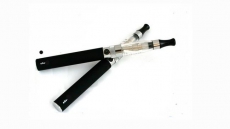TORONTO - It's not exactly the bionic eye that gave the Six Million Dollar Man of 1970s TV fame extraordinary vision, but a new implant is helping some people with virtually no sight due to degenerative retinal diseases to make out light and dark, and it may one day dramatically improve their ability to see.
Doctors at Toronto Western Hospital have implanted the Argus Retinal Prosthesis System in the first two patients as part of a 10-person clinical study, the first such operations performed in Canada.
The device implanted in the eye uses a tiny patch containing 60 electrodes that transfer image impulses to the retinal nerves, which then travel through the main optic nerve to the brain for processing.
The images are sent to the eye through a tiny video camera on the bridge of a special pair of glasses, which are wired to a small computer modulator worn outside the body.
"It stimulates the eye directly," ophthalmologist-in-chief Dr. Robert Devenyi said of the device, explaining that it bypasses the layer of the eye where the rods and cones would normally produce sight impulses. In patients with retinitis pigmentosa and other degenerative retinal diseases, the rods and cells are missing.
Orly Shamir, who was born with Leber Congenital Amaurosis, received the first implant June 5, and she has already seen improvement in her ability to discern light from dark — something she has not been able to do for the last 10 years.
Shamir, 46, said she had limited vision as a child, but was able to read large print and get around unaided. In her mid-20s her vision started to decline gradually and by her mid-30s, she suddenly couldn't make out sights most of us take for granted — the denomination on paper money, the details of her face in a mirror. Eight years ago, she got a guide dog.
"For the last 10 years now, I've had only a bit of light perception. There's no definition, there's nothing that I can use in order to get by," Shamir said Tuesday at a media briefing announcing the first two surgeries.
But just three months after the operation, Shamir said she is now able to make out blocks of white on a black computer screen that is part of her visual rehabilitation program at Toronto Western.
"I'm still in the beginning stages. Before the surgery I couldn't find images or movement on the computer screen. There was nothing that I could detect," she said. "Now I'm able to see movement. I can't tell the direction, but I can see movement."
The rehab is meant to retrain her brain to decipher the images she receives through the implant. Part of that process is having a rehab professional come to her Toronto home to help adapt the system for day-to-day activities, such as walking outside and being able to see where grass turns to sidewalk, for instance.
"Or in my kitchen, I'll be able to see on the counter where there's a plate or whatever that I'm looking for."
Shamir said the more she practises, the more she's able to recognize around her, even if it is only identifying certain shapes and textures.
"It's like starting all over again and one day I might see something I never saw before," said the married mother of three boys who works as a bank credit analyst. "And it's like, 'Oh wow. I could see this or I could at least know it's there.'"
One of her most exciting moments came when a rehab specialist showed her a board covered in black and white stripes, and she was able to see them as contrasting shades.
"My next step is to go to the Toronto zoo and find some zebras," she said, laughing.
Devenyi said Shamir's ability to see even that "is remarkable," and he called the eye implant a medical advance he hadn't expected to see in his lifetime.
But giving a patient the so-called bionic eye isn't cheap: the implant alone runs US$144,000, and then there are the costs of the fairly complicated surgery and the visual rehabilitation, he said.
The Argus implant, developed by California-based company Second Sight, is not yet approved for widespread use in Canada, although it has been given the green light by the U.S. FDA. Devenyi expects that Health Canada will soon approve the device, however, and the Toronto Western team plans to approach the Ontario government about funding the implant surgery.





